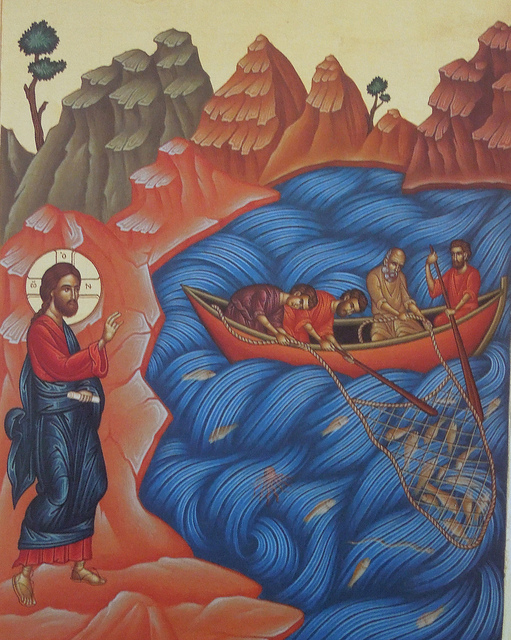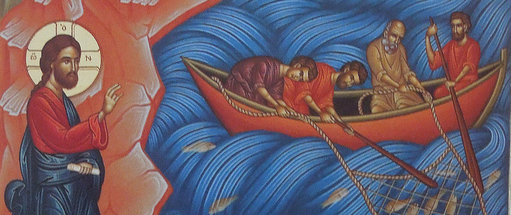The Barque of Peter
Scripture Readings

As I say so often in my Scripture commentaries, if you imagine that this story is an accurate representation of the call of Saint Peter to apostleship, you’re missing the point entirely. We know that the Gospel of Luke appeared around the year 70 AD—nearly an entire generation after the death and Resurrection of Christ. What was going on in the Greco-Roman world while Luke was composing his gospel? In Jerusalem, anti-Roman sentiment was rising to a fever pitch. Revolt was in the air.
The early Christian Church in Jerusalem appeared to the pagan world as simply another Jewish sect. Because of this, the Christians were faced with a choice. They could hang around, do nothing, and be lumped in by the Roman officials with the other revolutionary Jews, or, recognizing that Roman patience with Israel was growing thin, they could leave town and preserve themselves. They chose to leave, crossing the Jordan River into the Greek city of Pella, where they remained safe while the Romans brought the full weight of their army down on Jerusalem, destroying the temple in the process, in 70 AD.
From then on, to a great extent, the early Church turned away from Jerusalem and toward the pagan world. At that time, there was general dissatisfaction among the populace with the emptiness of the state religion, and there was a growing hunger for authentic spirituality. The cults of Isis and Mithras were attracting many followers. In this cultural climate, both Jewish and Christian missionaries were attracting seekers. However, since the Jewish authorities required prospective converts to be circumcised and to submit themselves to the entirety of the Law of Moses, they produced few converts. The Christians offered a viable and much more attractive spiritual practice, and they found themselves with large numbers of followers.
That’s the situation when Luke wrote. Let’s see what he does with it. The scene in today’s gospel is set on the shore of Lake Gennesaret. This is just another name for the Sea of Galilee, a body of fresh water thirteen miles long and seven and a half miles wide. It’s a symbolic location, like the mountains that so often appear in the gospels. The mountain is the place where Jesus goes to commune with the Father. The Sea of Galilee is where he goes to teach and to show powerful acts.
As sometimes happens, Jesus borrows a boat to use as a podium from which he can teach the crowds. Simon, the fisherman, is honored that the Master—another way of saying the rabbi—would choose his boat to teach from. So, when Jesus finally asks him to take him fishing, he complies. Notice that nowhere in this gospel story does Jesus say to Peter, “Come, follow me.” Instead, he has Peter do what he’s good at: fish. When Peter lowers his net, he’s richly rewarded. The result of this is that Simon Peter recognizes the power of God working through Jesus to transform his ordinary daily work. With this recognition, he changes his form of address from “Master” to “Lord”—the term used by observant Jews to refer to Yahweh, God.
I hope it’s fairly obvious that, in this story, Peter is not Peter, the boat is not a boat, and the fish are not fish. From earliest times, Christians used Peter’s boat as a symbol of the Church, not only in this story, but especially when it’s portrayed as foundering, or when Peter steps out of it and is in danger of losing his faith and drowning. The boat of Peter is the locus of Jesus’s teaching the spiritually hungry crowds. The teachings of Jesus and the work of Peter and the apostles draws so many “fish” to the little boat that it’s nearly overwhelmed, and the apostles with it.
Notice that Simon Peter is the principal character mentioned here. If the boat represents the Church, is Peter really Peter? Peter was put to death in 64 AD, so if Luke were talking about his contemporary faith community, he wouldn’t be referring to Peter the man, but to Peter, the chief of the apostles. Luke highlights Peter and his successors for their unique role in the leadership of the Church. In effect, the Church is Peter’s boat. The leaders of the Christian Church have to understand that their efforts on their own will accomplish nothing. But when their efforts are aligned with the will of God—in other words, when Jesus is in the boat—great things happen.
When leadership can acknowledge their personal powerlessness, they can begin to experience the power of the presence of God; and the experience of the presence of God brings all of us to humility. Peter cries out, “Depart from me, Lord, for I am a sinful man.” He has the same experience as we see with the Prophet Isaiah in today’s first reading. He’s shaken by the presence of God who calls him to the prophetic vocation, and he says, “Woe is me, I am doomed! For I am a man of unclean lips.” God sends a seraph with a red-hot coal to touch and cleanse Isaiah’s lips. Jesus answers Peter with the words, “Be not afraid.”
Has the message of today’s gospel been buried beneath the dust of the ages? Many in the Christian churches today are running around trying to enforce some kind of uniformity on people both in and outside the Church. The reaction of people to this kind of leadership is predictable: they want none of it. They find enforced obedience a “repellant absurdity” just as the first century gentiles reacted to being asked to observe the Law of Moses.
It’s not human efforts at marketing or enforcement that draw people to Jesus. It’s only when the loving kindness, compassion, generosity, and forgiveness of Jesus are allowed to become visible that the Church becomes attractive. Like in the first century, people today are hungry for authentic spirituality. Although none of us may be leaders of Christ’s Church, we can still make his presence felt. In our humility, we become windows through which others can see the face of God…or not. We can be channels of Christ’s teachings…or not. We can be the means through which the power of God accomplishes great things…or not.
As in the days of Isaiah the Prophet, the voice of the Lord is still asking, “Whom shall I send? Who will go for us?” Our challenge as Christians in Peter’s boat is to reply to that voice with everything we say and do, as Isaiah did: “Here I am. Send me.”
Get articles from H. Les Brown delivered to your email inbox.
